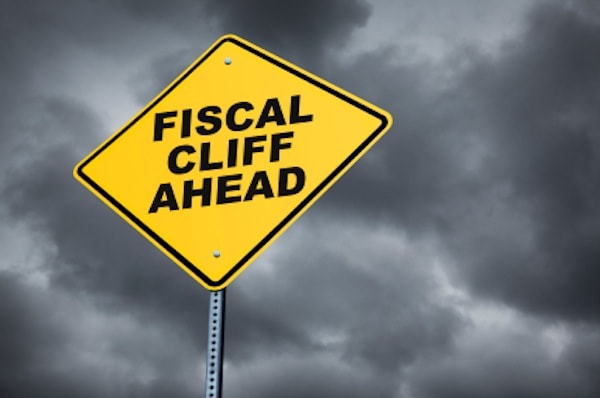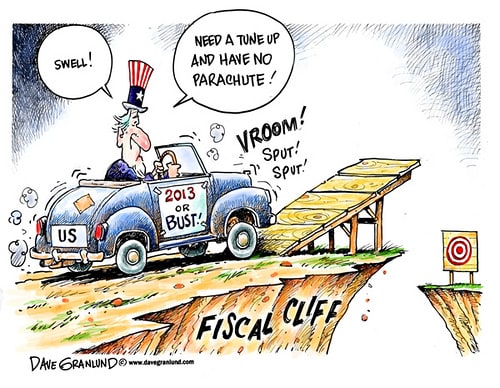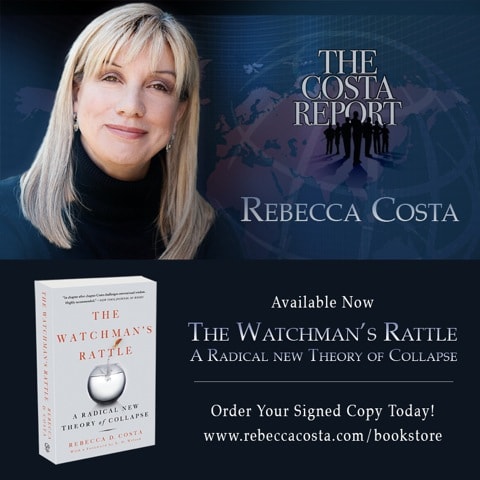Rebecca Costa is the author of âThe Watchmanâs Rattle: A Radical New Theory of Collapse,â which describes the earliest symptoms that have led to the demise of societies, institutions and organizations.
Letâs face it, we love a good cliffhanger. Our hearts pound, our bodies flood with chemicals, and within seconds weâre ready to flee or fight. It doesnât matter if itâs a snake in our path or a dangerous âfiscal cliffâ â weâre hard-wired to take action when a threat is near.
But what about threats farther down the road? Say, nuclear proliferation? Climate change? Pandemic viruses, overpopulation and an unstoppable demand for energy? Is there some reason we continue driving toward these cliffs, even though we know whatâs coming?
It turns out, the answer was staring me in the face as I sat down with my 20-something son for a birds-and-bees chat about his financial future. With no assets to speak of, heâs strapped with a student loan that may dog him until he retires. He has years of payments remaining on his car, and if financial institutions keep bombarding him with âfreeâ credit cards at 29 percent annual interest rates â well, you can see where all of this is heading and why a parent might worry.
Iâm a sociobiologist, so whenever I see irrational behavior, I reflexively look to our prehistoric history for an explanation. And when it comes to the fiscal cliff and other cliffs like it, I donât have to look far.
We are, by virtue of natureâs roll of the dice, an organism at war with itself. The vestiges of ancient genetic imperatives â territoriality, dominance, hoarding, fight and flight â clash with our ability to look ahead and take action to avert calamity. What? You thought our problems were political? Rooted in economics? Caused by inept leadership?
Welcome to the club.
Somewhere along the line, talking heads, politicians and experts decided that every problem we face is caused by politics and economics. So the only solutions we hear about are along these lines. In other words, a kind of narrowing has taken place: We blame our government, we blame the economy, we blame foreign competition, we blame Wall Street and big business.
But consider this: Every country in the world is struggling with a similar list of problems â job creation, wild fluctuations in financial markets, climate change, clean water, terrorism and so on. And yet, they each have their own political and economic systems, as well as vastly different cultures. At some point, a light bulb ought to go off. The reason the cliffs keep looming, one after the other, isnât just politics or economics. What we have is a species-wide problem.
Based on this simple biological truth, we can predict with some certainty that our leaders will follow the example of the Mayan, Roman and Khmer civilizations, and more recently, Greece and Spain: They will run the clock out. When the cliff is upon us, and our hearts pound and our bodies fill with ancient chemicals, we will spring into action with the same urgency we have when encountering a snake in our path.
Itâs a story as old as humankind itself.
As the nation braces for yet another heroic ninth-inning save, perhaps itâs time to examine our precarious predicament from 30,000 feet. Perhaps if we stopped making heroes out of those who reach out and snatch us from the jaws of disaster, we wouldnât need quite so many last-minute rescues. Perhaps one day our leaders will set aside their primitive instincts in favor of leveraging our greatest evolutionary advantage. Perhaps they will choose preemption over panic. Perhaps.
Rebecca Costa is a sociobiologist who offers a genetic explanation for current events, emerging trends and individual behavior. A thought-leader and provocative new voice in the mold of Thomas Friedman, Malcolm Gladwell and Jared Diamond, Costa is the foremost expert in âFast Adaptationâ tracing everything from terrorism, debt, epidemic obesity and upheaval in the Middle East to evolutionary imperatives.
Retiring at the zenith of her career in Silicon Valley, Costa spent six years researching and writing The Watchmanâs Rattle: Thinking Our Way Out of Extinction. In her book, Costa explains how the principles governing evolution cause and provide a solution for global gridlock. When asked why the book has special significance today, Costa claims, âEvery person I know, wants to know why our government gets more in debt, our air and water more polluted, our jails more crowded, our security more tenuous and our children more violent. We seem to have lost our ability to solve our problems. The Watchmanâs Rattle offers a genetic explanation for our paralysis, and prescribes a way out.â
The success of Rebecca Costaâs first book led to a weekly radio program in 2010 called The Costa Report onVoiceAmerica.com. The Costa Report is currently one of the fastest growing radio programs on the West Coast.








